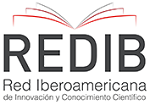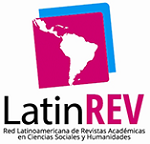Emprendemat, its influence on the development of economic and financial skills in the youth of the region of Catatumbo-Colombia.
DOI:
https://doi.org/10.15649/2346030X.698Keywords:
entrepreneurship, mathematics, skills, collaborative workAbstract
The objective of this research was to create a pedagogical strategy to strengthen the mathematical competencies of economic and financial education in eighth grade students of the institutions of the Convention and the municipality of Tarra, through collaborative work to develop business ideas based on EMPRENDEMAT. The research had a mixed approach that linked quantitative and qualitative data, of a quasi-experimental and analytical type. The research benefited 250 students between the ages of 13 and 16. As a result, the economic and financial education project allowed the identification of educational competencies that strengthen the development of mathematical skills in students in whom collaborative work and entrepreneurial spirit are implemented, based on mathematics as a transversal project. Pedagogical strategies based on EMPRENDEMAT were developed, which motivated students to enrich their mathematical knowledge and apply them in their daily lives. Likewise, it was determined that with the EMPRENDEMAT pedagogical strategy, the classroom experience is humanized and the students overcome context barriers, thereby achieving a social presence in the Catatumbo community. This generates workflow states characterized by high motivation, decision making based on evidence, concentration, interest, curiosity; because the student is immersed through strategy, in the challenge, enjoyment, teamwork to achieve goals. As elements of the impact of the pedagogical strategies on EMPRENDEMAT, it was determined that the student perceives greater closeness to a real context, links theory with practice, applies knowledge, achieves greater retention of concepts, improves academic performance in mathematics, strengthens educational competences economic and financial, as well as technical skills used in the administration and management of a business idea for evidence-based decision making.
References
J. Torres-Ortiz, "Incidencia de la Moodle en las prácticas en modalidad educativa B-Learning", Investigación, Desarrollo e Innovación, 39-48, 2012.
L. García, "La psicología positiva: del modelo de la reparación al modelo del fortalecimiento", Revista Hojas Informativas de los Psicólogos de las Palmas, 56,1-5, 2003.
M. Vergel-Ortega, H. Duarte y J. Martínez-Lozano, "Desarrollo del pensamiento matemático en estudiantes de cálculo integral su relación con la planificación docente", Revista Científica, 3(23), 17-29, 2016.
A. Castro-Solano, "Concepciones teóricas acerca de la Psicología Positiva" En A., Castro Solano (Comp.), Fundamentos de Psicología Positiva. 17-41. Paidós. Buenos Aires. 2010.
M. Castilla "Influencia del aprendizaje colaborativo en las competencias educativas económicas y financieras en el Colegio Guillermo Quintero Calderón del Municipio de convención" Cúcuta: Universidad Francisco de Paula Santander, 2019.
F. Carrero, "La comprensión lectora en el alumnado sordo desde la perspectiva de la escuela inclusiva", IJERI: International Journal of Educational Research and Innovation 8, 206, 2017.
K. Guzmán-Tinajero y S.M. Rojas-Drummond, "Escritura colaborativa en alumnos de primaria: un modelo social de aprender juntos", Revista mexicana de investigación educativa, 17(52), 217-245, 2012.
J.C. Cabero-Almenara y M. Llorente-Cejudo, "La alfabetización digital de los alumnos", Competencias digitales para el siglo XXI. Revista portuguesa de pedagogía, 42(2), 7-28, 2008.
P. Hallinger y R. Heck, "Collaborative leadership and school improvement: Understanding the impact on school capacity and student learning", REICE. Ibero-American Journal on Quality, Efficacy and Change in Education, 12 (4), 71-88, 2014.
J. Senehi, "Constructive Storytelling: A Peace Process Peace and Conflict", Studies 9, 2, 2002.
D. Ausubel, "Psicología Educativa: Un punto de vista cognoscitivo", México: Editorial Trillas, S. A., 1976.
P.N. Núñez, "Pedagogía social e interculturalismo: una lectura posible", Investigación, desarrollo e innovación, 141-149, 2015.
C. Gallo, "The Storyteller's Secret: From TED Speakers to Business Legends", Why Some Ideas Catch On and Others Don't (New York: St Martin's Griffin), 2017.
M. Vergel, J. Martinez y L. Zafra, "Inclúyeme en la U: Imaginario de universidad y calidad en la juventud en situación de discapacidad de la ciudad de Cúcuta", (Bogotá: Uniediciones Grupo Editorial Ibañez S.A.S), 2018.
J. Mejía, "Los Movimientos de proyectos educativos universitarios en un contexto histórico de la vida colombiana, en la construcción del Estado-Nación a finales del siglo XIX y comienzos del siglo XX", Revista Polémica, 134–155, 2010.
E. Rosabal, N. Romero, K. Gaquín y R. Mérida, "Risk behavior in adolescents", Revista Cubana de Medicina Militar, 44(2), 218-229, 2015.
J. Martínez, M. Vergel, S. Zafra, "Comportamiento juvenil y competencias pro-sociales", Bogotá: Editorial Ibañez, 2016.
V. Shuman, E. Clark-Polner, B. Meuleman, D. Sander y K.R. Scherer, "Emotion perception from a componential perspective", Cognition and Emotion, 31(1), 47-56, 2017.
L. Gutiérrez, "Paradigmas cuantitativo y cualitativo en la investigación socio-educativa: proyección y reflexiones", Paradigma, 14 (1), 7-25, 2017.
P. Heering y R. Wittje, "An Historical Perspective on Instruments and Experiments in Science Education", Science & Education, 21(2), 151–155, 2012.
L. Fernández, "Universidad, sociedad y conocimiento. Reflexiones para el debate", Avaliação, Campinas; Sorocaba, SP, v. 19, n. 3, p. 663-687, (nov) Universidad Nacional de Tres de Febrero. Buenos Aires, Argentina, 2014.
A. Pérez-Gómez, "Ethnography as an integrative method", Colombian Journal of Psychiatry, 41 (2), 421-428, 2012.
R. Sierra, "Social research techniques, theory and exercises", España: Paraninfo S.A., 1989.
J. Peck, "Using Storytelling to Promote Language and Literacy", Development the Reading Teacher, 43 2 141, 1989.
J. Olivera, M. Braun y A.J. Roussos, "Instruments for the Evaluation of Empathy in Psychotherapy". Argentine Journal of Clinical Psychology, 20 (1) 121-132, 2011.
A. Bautista-Ríos y G. Morales-Osorio, "Buenas prácticas y retos de una comunidad para la construcción del aprendizaje: experiencias del Centro de Español de la Universidad de los Andes", En: Escallón Largacha, E., y Forero Gómez, A. (autores-compiladores), Aprender a escribir en la universidad, Universidad de los Andes, Bogotá, p. 175-184, 2015.
M. Vergel, L. Paz y J. Rojas, "Concepciones de educación a distancia y matemática financiera desde la comprensión onto histórica de sus actores", Bogotá: UFPS-Ecoe ediciones, 2018.
I. Patiño, C. Vargas y D. Moreno, "Pizarra interactiva y matemática", Revista Covalente 1, 33, 2019.
J. Delgado, J.P. Rojas y M. Vergel-Ortega, "Geometrización de indicadores urbanos", Estrategia pedagógica en matemáticas desde una mirada de la socioespistemología, Bogotá: ECOE Ediciones. 95-112, 2019.
H. Woodhouse, "Storytelling in University Education: Emotion, Teachable Moments, and the Value of Life the Journal of Educational", Thought (JET) / Revue de la Pensée Éducative 45, 3 237.,2011.
Y. Duarte, J. Sánchez-Frank y C. Gómez-Colmenares, "El trabajo colaborativo en las competencias económicas y financieras en estudiantes del Instituto Agrícola Región del Catatumbo-Colombia", Revista Covalente, 1, 37-41, 2019.
J.P. Salazar y M. Vergel, "Hermeneusis de la práctica pedagógica y formación de estudiantes matemáticamente competentes", En Investigación y praxis en la enseñanza de las matemáticas, En: Colombia ISBN: 978-958-5430-87-7 ed: Universidad Simón Bolívar, 1. 71 – 103, 2018.
M. Fujioka, "U.S. writing center theory and practice: implications for writing centers in Japanese universities", Kinki University Center for Liberal Arts and Foreign Languages Education Journal, 2(1), 205 – 224, 2011.
M. García-Arocha, J. Rojas-Suarez y C.S. Gómez-Vergel, "Lenguaje algebraico", Un estudio mixto entre secuencias didácticas y comprensión lectora, Revista Covalente, 1, 47, 2019.
H. Parra, J. Suarez y M. Vergel, "Curricular trends in the University Francisco de Paula Santander academic program offerings", Journal of Physics: Conference Series 1329, 012013, 2019.
J.M. Peña y M.D. Castellano, "La lectura y la escritura en los estudiantes de instituciones educativas de Medellín participantes en el programa Prensa Escuela", Itinerario Educativo, 66, 225-246, 2015.
C. Duek, "Childhood, development and knowledge: children and their socialization", Latin American Journal of Social Sciences, Children and Youth, 8, 799-808, 2010.
E. López-Ovalle, C.A. Gomez-Colmenares y M, Vergel-Ortega, "Geocatatum: Its influence on the development of children’s geometric thinking Journal of Physics: Conference", series 1414, 2, 2019.
M. Vergel, J. Martínez y S. Zafra, "Validez de instrumento para medir la calidad de vida en la juventud: VIHDA", Revista Logos Ciencia & Tecnología 7, 20, 2015.
Downloads
Published
How to Cite
Issue
Section
Altmetrics
Downloads
License
The journal offers open access under a Creative Commons Attibution License

This work is under license Creative Commons Attribution (CC BY 4.0).











